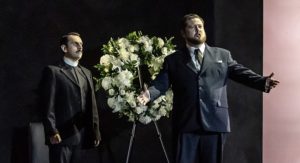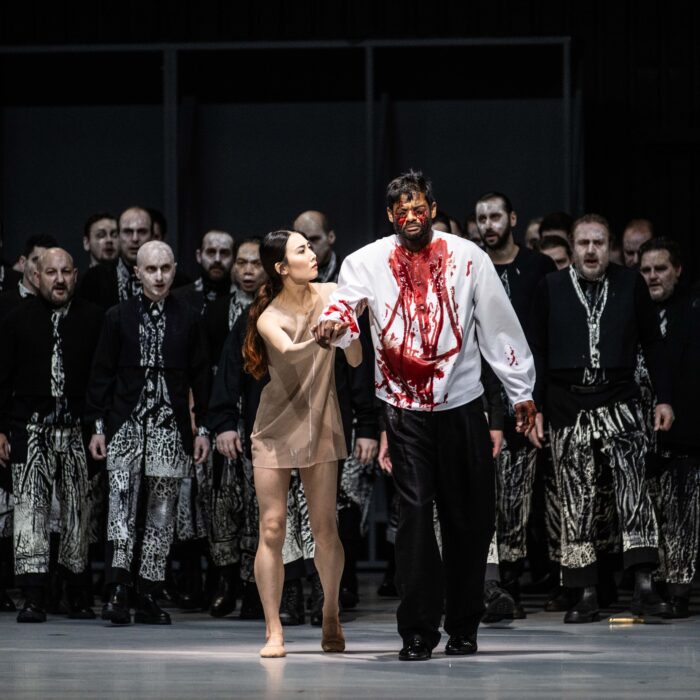
Wexford Festival Opera 2021 Review: I Capuleti e i Montecchi
Rosetta Cucchi’s Initiative to Nurture Young Talent Bears Fruit
By Alan Neilson(Photo: Clive Barda)
On taking up the post of Artistic Director for Wexford Festival Opera in 2020, Rosetta Cucchi introduced a number of innovations, one of which was the establishment of the Wexford Factory aimed at offering professional and financial support to young singers in the early stages of their careers. A central part of the initiative is the presentation of an opera on the main stage, in which all the roles are played by members of the Factory. This year’s production was Bellini’s “I Capuleti e i Montecchi,” chosen to fit in with the festival’s theme, “Shakespeare in the Heart.”
Obviously, the production had to operate on a lower budget than the festival’s main operas, but with the exception of the orchestra, which was reduced to a string quartet and piano, it had no negative impact on the presentation.
Hanratty’ Incisive Direction
The director Conor Hanratty, aided by Serena Treppiedi, who oversaw the set designs, produced a fine reading in which the two main pillars of the drama, love and violence, were brought clearly into the foreground. Hanratty moved the drama from the 12th century into what appeared to be the early to mid 20th century, and costumed the cast accordingly, with designs by Frances White. It gave the almost entirely male cast a conspiratorial, even mafioso appearance, which Hanratty exploited by having them congregate in a close knit group, often at the side of the stage. Romeo, Giulietta and Lorenzo were not part of the group, they occupied different spaces and were costumed very differently.
The staging was basic, but very effective, consisting for the most part of a large dark room, with a few chairs and a small table set on one side where the man congregated. At the back of the stage was an open door onto a balcony with a curtain which moved gently, blown by the hot summer breeze, perfectly conjuring up the atmosphere of an Italian palazzo on a warm summer’s evening. The inclusion of a large wreath placed on a stand acted as a constant reminder of the violence which underpins the drama. For the final scene the stage is given over to a large tomb, with the word Capuleti carved on its front, and surrounded by candles upon which Giulietta’s body lay, once more focusing the attention on the violence and death which surrounds the couples relationship.
Moreover, the general sparseness of the staging, supported by well-designed lighting, was sensitively exploited by Hanratty to magnify the intimacy of Romeo and Giulietta’s relationship. In fact, Hanratty’s coaching of the singers was excellent throughout. The entire cast, without exception, acted out their parts convincingly. In particular, Romeo, played by Anna Brady was brilliantly rendered. Her posturing and movement created a realistic impression that we were watching a man, even the fight scenes gave little hint that it was a woman in the role.
A Musical Twist
Musically, this proved to be a very interesting production, in which the piano and ConTempo quartet accompaniment, directed by Giuseppe Montesano, opened up a slightly different perspective. If much of the score’s textural depth and variety were lost, along with its sonorous contrasts, it was compensated for by the delicacy and sensitivity which pervaded the performance, which had the effect of enhancing the intimate nature of the drama, and making the audience feel like a confidential witness to a private affair. It would be going too far, however, to suggest it was superior to full orchestral performance, but it certainly had merit.
The young singers were ably supported by Montesano, and performed their parts well and with a confidence which belied their experience.
Mezzo-soprano Anna Brady produced an energetic and emotionally powerful performance in the role of Romeo. When either strutting around the stage challenging the Capuleti clan, or passionately wooing Giulietta, she convincingly assumed the persona of a young gallant, ready to fight for what he wants.
Her singing was equally powerfully crafted, there was never any sense that she was holding anything back, she gave everything in what was a free flowing, emotionally charged presentation. She possesses a bright, versatile voice with a consistent timbre, and confidently accented the vocal line to develop her character. She possesses an impressive coloratura and did not shirk from taking risks, if anything she was too enthusiastic at times, which added to her characterisation of Romeo as a courageous lover.
Soprano Jade Phoenix was equally successful with her portrayal of Giulietta. She produced a measured, intelligent performance in the role, which contrasted nicely with Romeo’s passionate impetuosity.
Her Act two aria “Ah! Non poss’io partire” was sensitivity rendered, and illustrated her exquisitely detailed phrasing, which captured her deep pain at deceiving her father. It is also a very attractive voice. Not only does she possess an appealing timbre, but she can move easily across the registers without any signs of stress, and her coloratura is calmly and precisely delivered.
The two principal singers produced two very different presentations. Brady pushed herself to the limit, took risks and was emotionally fiery, while Phoenix was detailed, precise and thoughtful, but both were equally convincing. They complemented each other’s performance splendidly, their contrasting styles bringing out the strengths in the other. The finale in which Romeo takes poison, only for Giulietta to wake up and watch him die, was excellently crafted, and captured the desolation and pathos of the scene.
Solid Supporting Cast
Rory Dunne produced a nicely layered presentation of Giulietta’s father Capellio, in which he managed to successfully display the conflicting emotions he had for his daughter, even if ultimately he was hard and unforgiving. He sang convincingly with a strength and purpose which captured his character’s authority and single-mindedness. He has a pleasing bass-baritone which exhibits an attractive rumbling vibrato in the lower register, and produced an expressive performance in which he showed particular skill in delivering well-crafted passages of recitative.
Tenor Aleksey Kursanov was cast as the Capuleti partisan Tebaldo, whose defining characteristics are his love for Giulietta and hatred for Romeo. He has a strong attractive lyrical voice, which he used to spin out long, neatly crafted lines, but was equally capable of injecting aggression into the voice as illustrated by his duet “Stolto! ad un sol mio grido” with Romeo. The opening scena allowed him to display his vocal flexibility and appealing upper register.
Bass Conall O’Neill produced a pleasing performance in the role of the Priest, Lorenzo. He possesses a firm, dark voice which allowed him to successfully develop his character.
There was small all-male chorus, also from the Wexford Factory, which sang and acted out its parts well.
If nothing else, this production of “I Capuleti e i Montecchi” validates Cucchi’s decision to establish the Wexford Factory, and to commit the Wexford Festival Opera to developing tomorrow’s opera singers. But, it was something else! It was also a well-staged production, with excellent performers, and a very pleasing way to spend an afternoon.



